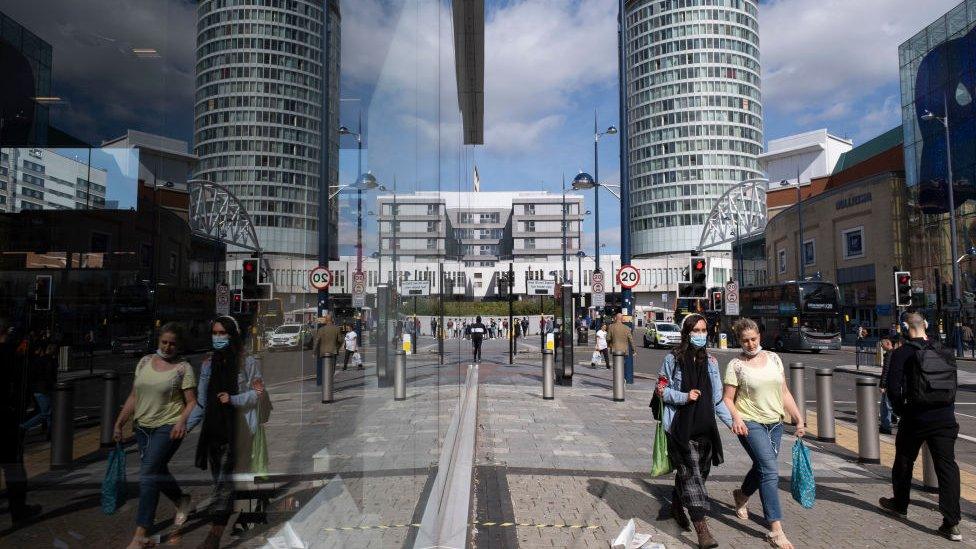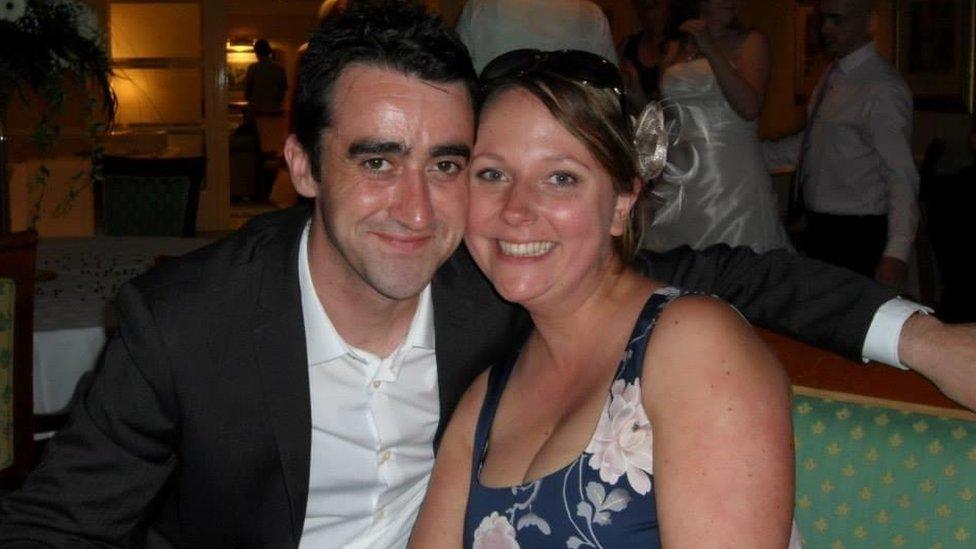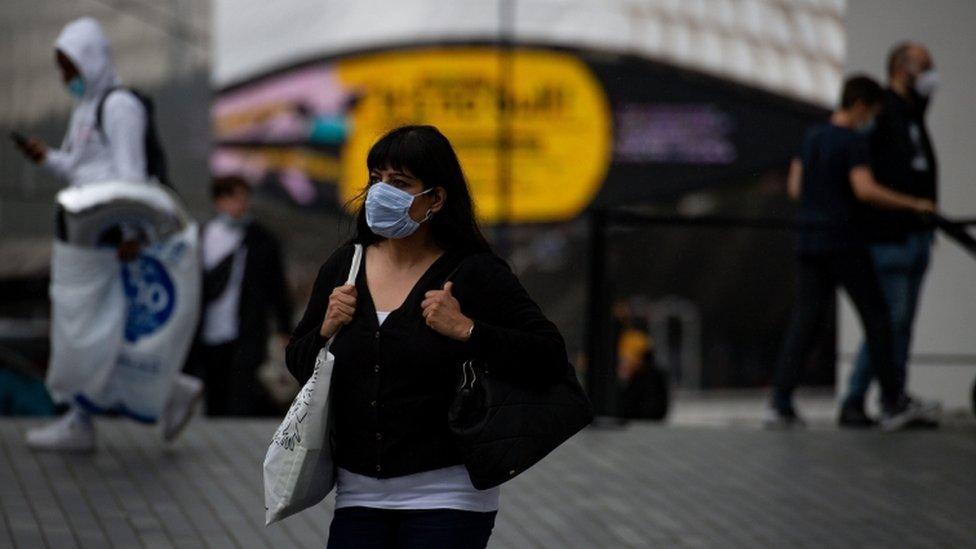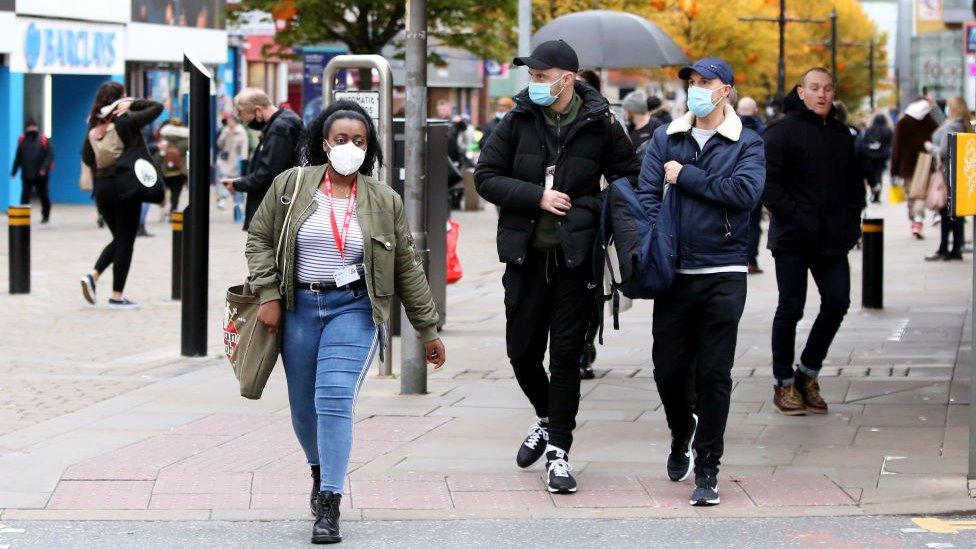Working parents feel 'penalised' by new coronavirus restrictions
- Published

New restrictions come into force in Birmingham, Solihull and Sandwell on Tuesday
New lockdown restrictions being introduced in parts of the West Midlands are creating childcare problems, parents say.
Households in Birmingham, Solihull and Sandwell must not mix from Tuesday following a spike in coronavirus cases.
Those who rely on family to help with childcare said they felt "penalised".
Under the new guidelines, people cannot meet anyone from another household, or outside their support bubble, but the hospitality sector is not affected.
It means people cannot meet indoors or in private gardens, but can still go out to shops, restaurants and other venues in a maximum group of six from more than one household.
Announcing the new guidelines last week, the leader of Birmingham City Council, Councillor Ian Ward, explained it was "much easier to inadvertently pass on the virus in someone's house where people are more relaxed and less vigilant".

Michelle McDaid, pictured with husband Kieron, said the restrictions were creating childcare problems
Michelle McDaid, from Solihull, relies on her parents to help with childcare and said the rules were "frustrating".
She looks after her eight-year-old son Finley after school while working as an accounts assistant, but parents Angela and Fred Dale care for her younger son Alfred, two, while she works.
MP's exemption call
She said she had "crammed" in as much work as she could over the weekend and would try to work in the evenings to allow her to look after Alfred during the day.
"I am fortunate that I can have some flexibility with my hours, but if we are to function as a family, we need time together as a family," she said.
"The biggest frustration for me when the guidelines were issued was, if I wanted to, I could drop Alfred at a Wetherspoons at 08:00, they could spend the day with him at the pub, but they can't do that at their own house."
"I feel quite penalised in a way," she added.
Ms McDaid's MP, Julian Knight, has written to the health secretary calling for an exemption for people who rely on others for childcare.

The Conservative MP for Solihull, Julian Knight, has called for childcare providers to be allowed to visit households
"With the restrictions on households meeting posed by the Solihull local lockdown, many parents who rely on informal, family childcare arrangements now find their plans in jeopardy," he wrote.
"I urge you to make a small exemption to the rules and allow grandparents or friends who care for children to form support bubbles with the households of key and shift workers."
Birmingham residents react to new lockdown restrictions
'Like fire safety'
Dr Justin Varney, Birmingham's director of public health, said the restrictions targeted households rather than pubs and restaurants because data suggests that is where most transmission was happening.
"People are meeting up behind closed doors and just forgetting to keep a two-metre distance, going for a handshake or a hug, passing a plate of biscuits from each other, and that's spreading the virus," he said.
Reacting to concerns like Ms McDaid's about being able to meet in pubs, but not at home, Dr Varney said he thought of social distancing "a bit like fire safety".
"In a pub or a restaurant, they've got to have fire extinguishers, fire exits and a plan to keep you safe," he said. "It's no different from Covid."
Amanda Leek, 52, from Sandwell, normally looks after her five-year-old grandson while her daughter works part-time.
She said it was "heartbreaking" trying to explain that they would not be able to spend time together and remained concerned about the risks of socialising in public.
"He can't come to Nanny's house, I can't go to his house but I can go and sit in Costa with him," she said.
"But I am not prepared to go and sit anywhere in this current situation."
Dr Varney said the council was keeping a close eye on the hospitality industry and had made it "absolutely crystal clear" what was expected from them to keep customers safe.
The authority also launched door-to-door testing on Monday, with volunteers targeting areas with higher number of cases to drop off home-testing kits.

SOCIAL DISTANCING: What are the rules now?
LOOK-UP TOOL: How many cases in your area?

Follow BBC West Midlands on Facebook, external, Twitter, external and Instagram, external. Send your story ideas to: newsonline.westmidlands@bbc.co.uk , external
- Published13 September 2020

- Published11 September 2020

- Published4 November 2020
